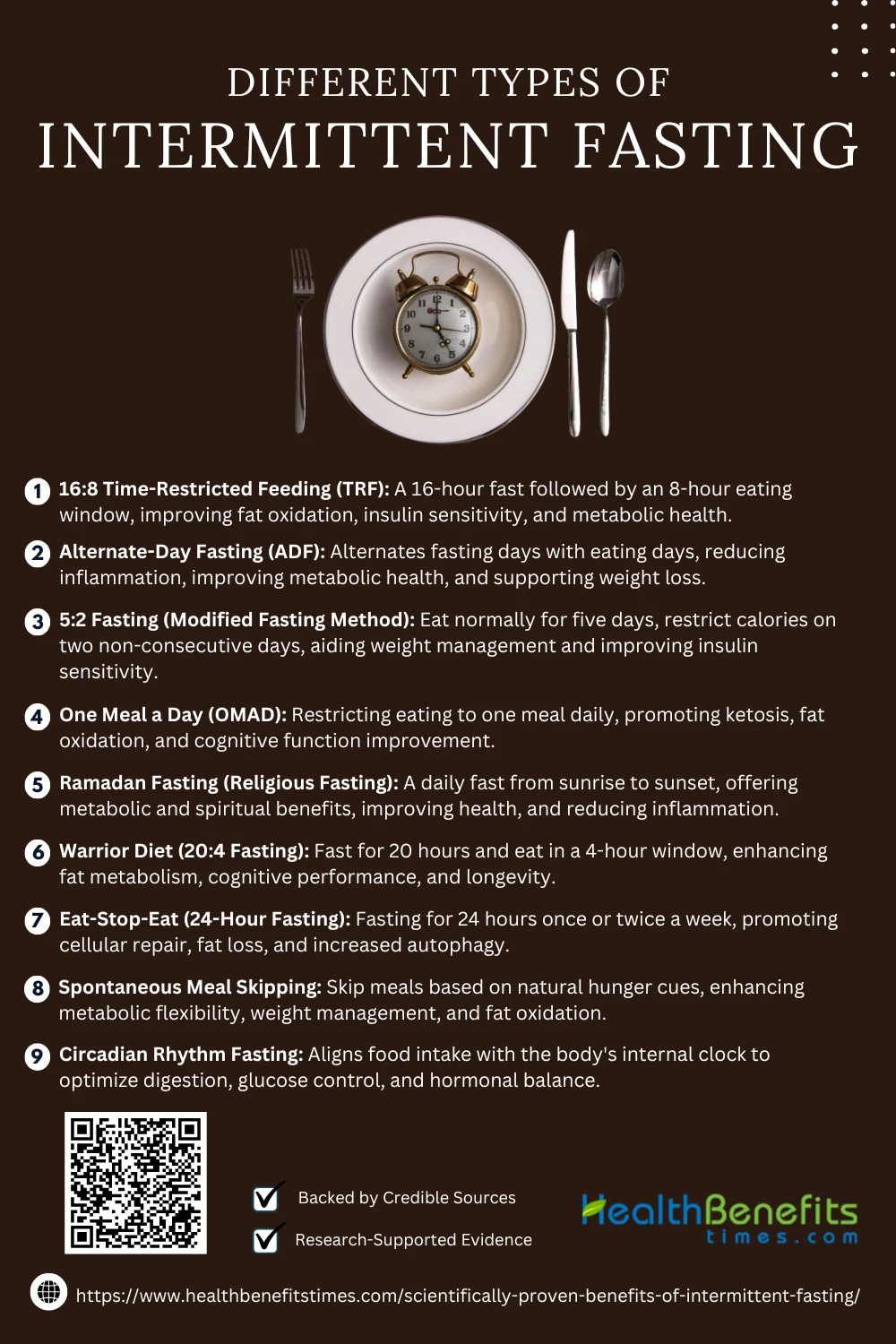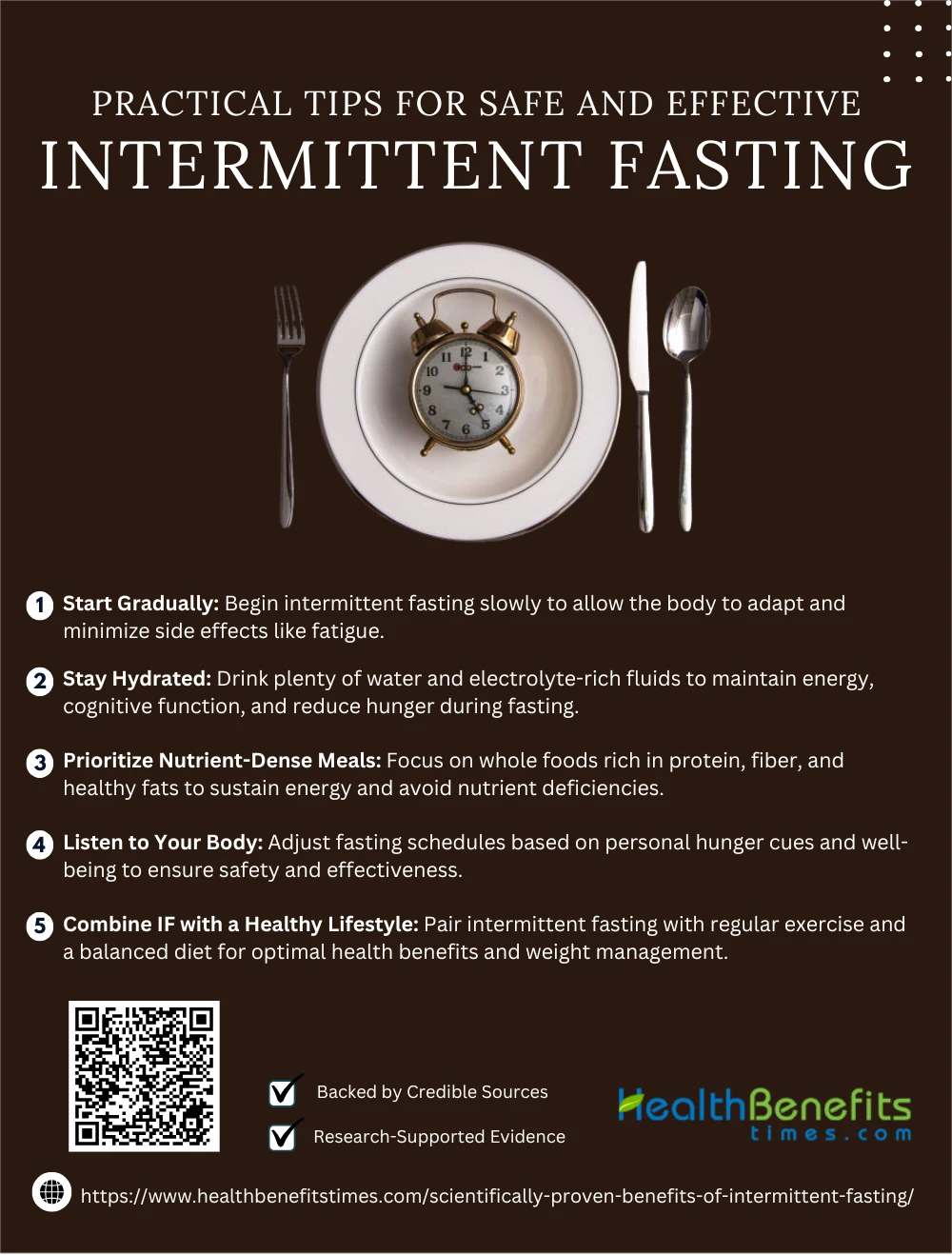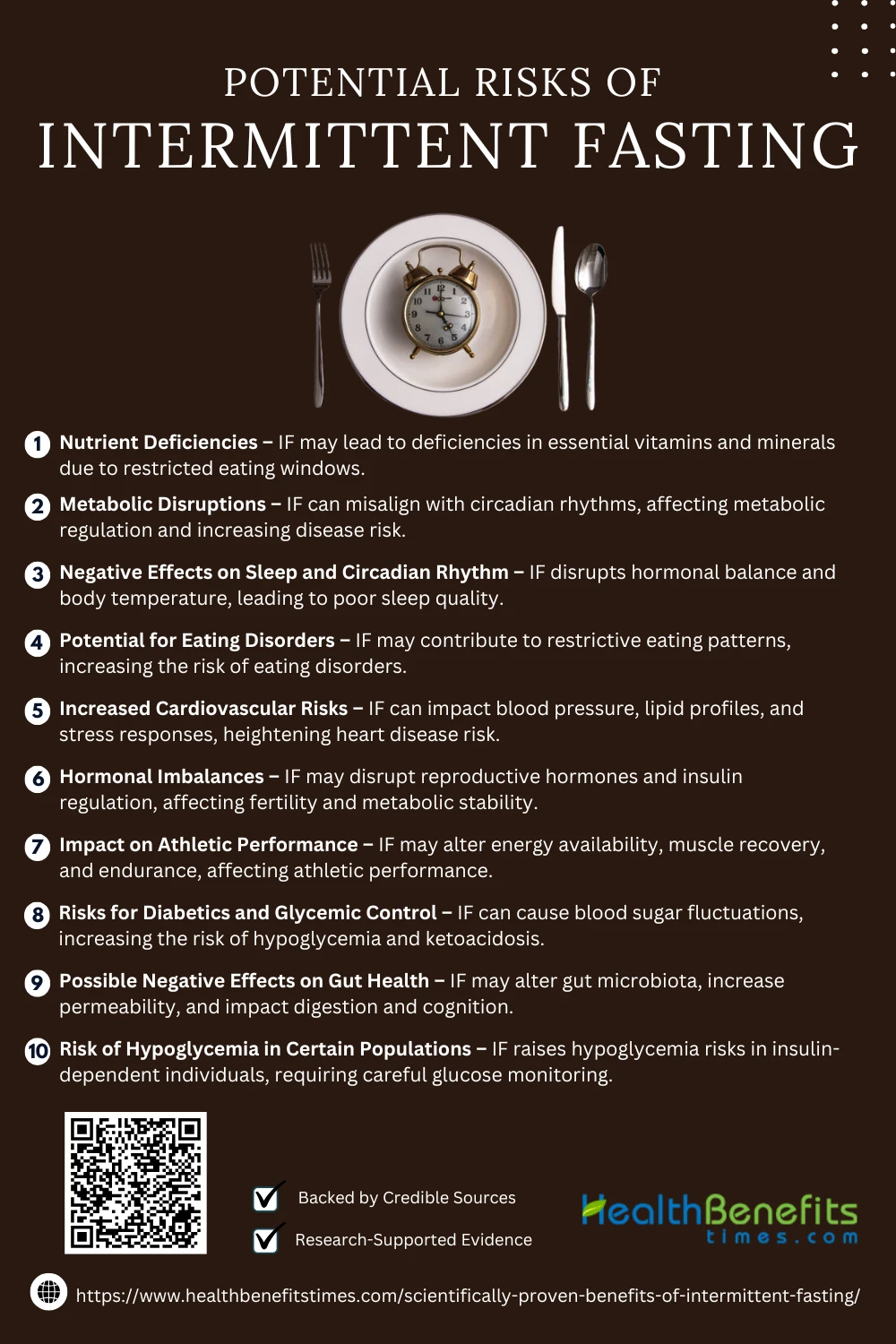- Intermittent fasting is an eating pattern that alternates between periods of fasting and eating.
- Intermittent fasting improves insulin sensitivity and supports weight management.
- Studies suggest it enhances brain function and may contribute to increased lifespan.
 Intermittent Fasting (IF) is a dietary approach that alternates between periods of eating and fasting, aiming to enhance metabolic flexibility and improve overall health. Over recent years, numerous scientific studies have demonstrated the profound impact of IF on metabolic function, longevity, and disease prevention. Research indicates that IF can enhance insulin sensitivity, which plays a critical role in managing type 2 diabetes and reducing obesity-related complications. Additionally, IF triggers autophagy, a cellular process that eliminates damaged components and promotes regeneration, contributing to anti-aging and longevity. Studies suggest that IF also improves cognitive function by increasing brain-derived neurotrophic factor (BDNF), which is essential for memory and learning. Furthermore, IF has been linked to reduced inflammation and oxidative stress, lowering the risk of chronic diseases like cardiovascular disease and cancer. Notably, fasting has been found to regulate hormones that control hunger and metabolism, enhancing weight loss and energy balance. Another remarkable benefit is its ability to protect against neurodegenerative diseases, including Alzheimer’s and Parkinson’s, by reducing neuroinflammation and enhancing mitochondrial function. Additionally, IF positively impacts gut health by diversifying the microbiome and improving digestive efficiency, which can reduce bloating and promote a healthy gut lining. Lastly, ongoing research continues to explore IF’s role in cancer prevention, particularly through metabolic regulation and tumor growth inhibition, making it a promising adjunct therapy. With these scientifically proven benefits, IF is becoming a widely recommended approach to achieving long-term health and longevity.
Intermittent Fasting (IF) is a dietary approach that alternates between periods of eating and fasting, aiming to enhance metabolic flexibility and improve overall health. Over recent years, numerous scientific studies have demonstrated the profound impact of IF on metabolic function, longevity, and disease prevention. Research indicates that IF can enhance insulin sensitivity, which plays a critical role in managing type 2 diabetes and reducing obesity-related complications. Additionally, IF triggers autophagy, a cellular process that eliminates damaged components and promotes regeneration, contributing to anti-aging and longevity. Studies suggest that IF also improves cognitive function by increasing brain-derived neurotrophic factor (BDNF), which is essential for memory and learning. Furthermore, IF has been linked to reduced inflammation and oxidative stress, lowering the risk of chronic diseases like cardiovascular disease and cancer. Notably, fasting has been found to regulate hormones that control hunger and metabolism, enhancing weight loss and energy balance. Another remarkable benefit is its ability to protect against neurodegenerative diseases, including Alzheimer’s and Parkinson’s, by reducing neuroinflammation and enhancing mitochondrial function. Additionally, IF positively impacts gut health by diversifying the microbiome and improving digestive efficiency, which can reduce bloating and promote a healthy gut lining. Lastly, ongoing research continues to explore IF’s role in cancer prevention, particularly through metabolic regulation and tumor growth inhibition, making it a promising adjunct therapy. With these scientifically proven benefits, IF is becoming a widely recommended approach to achieving long-term health and longevity.
How Intermittent Fasting Works
Intermittent Fasting (IF) works by alternating between fasting windows, where no calories are consumed, and eating periods, during which meals are taken within a designated timeframe. Popular fasting methods include 16:8 (fasting for 16 hours, eating within 8 hours) and 5:2 (eating normally for five days and restricting calories for two days). During fasting, the body shifts from using glucose to burning stored fat for energy, a process called metabolic switching. This transition reduces insulin levels, enhances autophagy (cellular repair), and boosts fat oxidation. Additionally, fasting stimulates the production of ketones, which support brain function and may reduce inflammation and oxidative stress. Over time, IF has been linked to improved metabolic health, increased longevity, and better cognitive function.
Different types of intermittent fasting
Intermittent Fasting (IF) comes in various forms, each offering unique benefits and challenges. Below is a listicle summarizing the most common IF methods, supported by scientific studies.
1. 16:8 Time-Restricted Feeding (TRF)
The 16:8 fasting method involves a 16-hour fasting window followed by an 8-hour eating period, helping regulate metabolic health. Studies show that TRF enhances fat oxidation and insulin sensitivity, contributing to weight loss and cardiovascular benefits. (1) Additionally, research highlights its anti-inflammatory properties, which may aid in managing metabolic-associated fatty liver disease. (2)
2. 5:2 Fasting (Modified Fasting Method)
The 5:2 fasting method involves eating normally for five days and restricting intake to 500-600 calories on two non-consecutive days. Research suggests it improves appetite control and reduces overall caloric intake, aiding in weight management. (3) Additionally, the 5:2 method is linked to improved insulin sensitivity and metabolic health, particularly in individuals with obesity and type 2 diabetes. (4)
3. Alternate-Day Fasting (ADF)
Alternate-Day Fasting (ADF) involves alternating between fasting days (zero or minimal calories) and eating days. Research suggests it significantly lowers inflammation and improves metabolic health, reducing disease risk. (5) Additionally, studies highlight its effectiveness in weight loss and long-term adherence, particularly among women. (6)
4. One Meal a Day (OMAD)
The OMAD fasting method restricts eating to one meal per day, promoting ketosis and cellular repair. Research suggests OMAD enhances fat oxidation and insulin sensitivity, leading to improved weight control. (7) Additionally, OMAD may support better energy utilization and cognitive function, making it a potential tool for metabolic optimization. (8)
5. Warrior Diet (20:4 Fasting)
The Warrior Diet involves fasting for 20 hours followed by a 4-hour eating window, mimicking ancient eating patterns. Research shows it reduces inflammation and improves metabolic function, supporting longevity. (9) Additionally, this fasting method may enhance fat metabolism and cognitive performance, making it beneficial for athletes and active individuals. (10)
6. Eat-Stop-Eat (24-Hour Fasting)
The Eat-Stop-Eat method involves fasting for 24 hours once or twice a week, promoting cellular repair and fat loss. Research indicates that it enhances insulin sensitivity and reduces oxidative stress, improving metabolic health. (11) Furthermore, this fasting approach is linked to increased autophagy, which supports longevity and overall well-being. (10)
7. Spontaneous Meal Skipping
Spontaneous meal skipping involves skipping meals based on natural hunger cues, rather than following a strict fasting schedule. Research suggests it enhances metabolic flexibility and reduces overall caloric intake, supporting weight management. (12) Additionally, skipping meals may lead to improved fat oxidation and better energy balance, with minimal risk of metabolic slowdown. (13)
8. Circadian Rhythm Fasting
Circadian rhythm fasting aligns food intake with the body’s internal clock, optimizing digestion and metabolism. Research indicates this approach improves glucose control and supports hormonal balance, reducing the risk of metabolic disorders. (14) Additionally, studies highlight its potential to regulate sleep-wake cycles, benefiting cognitive and cardiovascular health. (15)
9. Ramadan Fasting (Religious Fasting)
Ramadan fasting, observed by Muslims worldwide, involves abstaining from food and drink from sunrise to sunset, promoting metabolic and spiritual benefits. Research highlights that it improves metabolic health and may reduce inflammation, contributing to overall well-being. (16) Additionally, studies indicate Ramadan fasting positively influences oral health and reduces salivary acidity, lowering the risk of dental issues. (17)
Scientifically Proven Benefits of Intermittent Fasting
Intermittent fasting (IF) is more than just a diet trend—it’s a science-backed approach to improving health. Research shows IF enhances metabolism, supports weight loss, boosts brain function, and promotes longevity through cellular repair.
1. Boosts Metabolism & Enhances Fat Burning
Intermittent fasting (IF) enhances metabolism by promoting fat oxidation and increasing metabolic flexibility. Studies indicate that IF improves insulin sensitivity and lipid metabolism, leading to greater fat-burning efficiency. (18) Additionally, research highlights that IF triggers human growth hormone (HGH) production, which supports muscle preservation and fat loss. (19) Furthermore, 5:2 fasting protocols have been shown to increase lipid oxidation and energy expenditure. (20) IF also promotes metabolic resilience, reducing the likelihood of obesity and related conditions. (21) Lastly, research suggests that IF can positively modulate gut microbiota, further contributing to improved metabolic health. (22)
2. Enhances Cellular Repair & Longevity via Autophagy
Intermittent fasting (IF) activates autophagy, a process where cells remove damaged components and regenerate, contributing to longevity and disease prevention. (23) Studies indicate that IF stimulates p53 gene expression, which plays a crucial role in cellular repair and aging. (24) Additionally, IF enhances neuroprotection by reducing oxidative stress and promoting mitochondrial health, lowering the risk of neurodegenerative diseases. (25) Research also shows that IF increases sirtuin levels, which are proteins associated with extended lifespan and metabolic efficiency. (26) Lastly, intermittent fasting has been linked to improved stem cell function, promoting tissue repair and regeneration. (27)
3. Improves Insulin Sensitivity & Reduces Risk of Type 2 Diabetes
Intermittent fasting (IF) enhances insulin sensitivity by reducing fasting blood glucose and improving metabolic flexibility. Studies indicate IF lowers insulin resistance and optimizes lipid profiles, reducing the risk of type 2 diabetes. (28) Research also shows that IF can help prediabetic individuals maintain stable glucose levels, potentially preventing the onset of diabetes. (29) Additionally, fasting is linked to beta-cell preservation, which is essential for insulin production and diabetes management. (30) Furthermore, IF aligns with circadian rhythms, which plays a crucial role in blood sugar regulation and reducing insulin resistance. (31) Finally, clinical trials suggest that IF improves glucose metabolism and weight control, making it a viable strategy for diabetes prevention. (32)
4. Reduces Inflammation & Oxidative Stress
Intermittent fasting (IF) effectively reduces inflammation by lowering pro-inflammatory markers and oxidative stress. Research suggests IF improves antioxidant defenses and mitigates chronic inflammation, which is linked to various diseases. (33) IF has also been shown to modulate inflammatory pathways, leading to decreased systemic inflammation in individuals with metabolic disorders. (34) Additionally, alternate-day fasting (ADF) appears to protect against oxidative stress-related cellular damage, improving overall health outcomes. (5) Furthermore, studies highlight that IF lowers oxidative stress in neurocognitive disorders, potentially reducing neurodegeneration risk. (35) Lastly, IF enhances mitochondrial function, which plays a key role in reducing inflammation and promoting cellular health. (36)
5. Supports Brain Health & Protects Against Neurodegeneration
Intermittent fasting (IF) enhances brain function by increasing brain-derived neurotrophic factor (BDNF), a key protein that supports learning and memory. Studies indicate that IF reduces neuroinflammation and oxidative stress, protecting against cognitive decline and neurodegenerative diseases. (37) Additionally, IF improves mitochondrial efficiency in neurons, enhancing brain metabolism and resilience to aging-related diseases like Alzheimer’s and Parkinson’s. (38) Research suggests IF activates autophagy, a process that clears damaged brain cells, promoting longevity. (39) Furthermore, IF supports synaptic plasticity, which is essential for cognitive performance. (40) Lastly, IF may lower the risk of stroke and vascular dementia, contributing to long-term brain health. (41)
6. Lowers Risk of Heart Disease
Intermittent fasting (IF) significantly reduces cardiovascular risk factors, including high blood pressure, cholesterol, and triglycerides. Studies indicate that IF lowers LDL (bad cholesterol) and increases HDL (good cholesterol), promoting heart health. (42) Research suggests IF improves vascular function by reducing arterial stiffness and inflammation, which are key contributors to heart disease. (43) Additionally, fasting enhances metabolic flexibility, allowing the heart to efficiently utilize fat for energy, reducing the burden on the cardiovascular system. (44) IF has also been shown to lower blood pressure and improve endothelial function, reducing the likelihood of stroke and heart attacks. (45) Lastly, long-term IF adherence is linked to a lower incidence of cardiovascular disease (CVD), making it a promising lifestyle intervention for heart health. (46)
7. May Help Prevent Cancer
Intermittent fasting (IF) may help reduce cancer risk by triggering autophagy, a cellular process that removes damaged components, preventing tumor growth. Research suggests IF improves metabolic regulation, limiting glucose availability for cancerous cells and inhibiting proliferation. (34) Additionally, fasting has been shown to enhance chemotherapy sensitivity, making cancer cells more vulnerable to treatment. (47) Studies also highlight that IF reduces inflammation and oxidative stress, key contributors to cancer progression. (44) Furthermore, IF may prevent obesity-related cancers by regulating insulin and leptin levels. (48) Lastly, research suggests fasting may protect against colorectal and liver cancer, improving overall health outcomes. (49)
8. Supports Gut Health & Microbiome Balance
Intermittent fasting (IF) positively influences gut microbiota composition, promoting beneficial bacteria growth and reducing harmful microbes. Studies indicate IF enhances gut barrier integrity, lowering the risk of leaky gut syndrome and inflammation-related diseases. (50) Additionally, research suggests that IF improves digestion and supports nutrient absorption, benefiting overall gut function. (32) IF has also been linked to increased microbial diversity, which is crucial for metabolic and immune health. (51) Furthermore, studies show that IF reduces gut inflammation, making it a potential therapeutic approach for gastrointestinal disorders. (32) Lastly, fasting cycles may help regulate circadian rhythms in gut bacteria, optimizing digestion and metabolic efficiency. (51)
9. May Extend Lifespan
Intermittent fasting (IF) is increasingly recognized for its potential to extend lifespan by enhancing cellular repair and metabolic efficiency. Studies suggest that IF triggers autophagy, a cellular renewal process linked to longevity. (52) Furthermore, IF enhances mitochondrial function and reduces oxidative stress, both key factors in aging. (53) Research also indicates that IF may reduce the risk of age-related diseases like cardiovascular disease and neurodegeneration. (21) With its ability to modulate metabolic pathways and promote resilience, IF stands out as a potential dietary strategy for increasing lifespan. (44)
Practical Tips for Safe and Effective Intermittent Fasting
Intermittent fasting offers numerous health benefits, but doing it safely and effectively is key to long-term success. This guide provides practical tips to help you manage hunger, maintain energy, and maximize results while avoiding common pitfalls.
1. Start Gradually
Beginning intermittent fasting gradually helps the body adapt and minimizes side effects like fatigue and irritability. Experts suggest starting with shorter fasting windows and progressively increasing them. (54) Gradual adaptation also supports metabolic flexibility, improving long-term adherence and benefits.
2. Stay Hydrated
Proper hydration is crucial for maintaining electrolyte balance and preventing dehydration during intermittent fasting. Drinking water, herbal teas, and electrolyte-rich fluids helps sustain energy levels and cognitive function. (55) Research also highlights that staying hydrated reduces hunger sensations, making fasting periods more manageable. (56)
3. Prioritize Nutrient-Dense Meals
Consuming nutrient-dense meals is crucial for sustaining energy and preventing nutrient deficiencies during intermittent fasting. Experts recommend whole foods rich in protein, fiber, and healthy fats to support metabolism. (57) A well-balanced diet enhances fasting benefits and ensures long-term adherence. (58)
4. Listen to Your Body
Intermittent fasting should be adapted based on individual needs, as ignoring signals like fatigue or dizziness may lead to negative effects. Monitoring hunger cues and adjusting fasting schedules accordingly ensures safety. Research highlights that fasting should be flexible, aligning with personal well-being and lifestyle.
5. Combine IF with a Healthy Lifestyle
Integrating intermittent fasting (IF) with a balanced lifestyle enhances its effectiveness by improving metabolic health and glycemic control. (29) Studies suggest combining IF with regular physical activity and a nutritious diet optimizes long-term health benefits and weight management. (4)
Potential Risks of Intermittent Fasting
Intermittent fasting (IF) is widely recognized for its potential health benefits, but recent research highlights several risks and drawbacks. Below is a list of key concerns based on current studies:
1. Nutrient Deficiencies
Intermittent fasting (IF) can lead to nutrient deficiencies due to reduced eating windows, potentially impacting essential vitamin and mineral intake. Studies indicate that IF might cause deficiencies in niacin and other micronutrients, affecting overall health. (59) Moreover, research highlights concerns about IF’s impact on micronutrient absorption and its potential long-term consequences. (60)
2. Metabolic Disruptions
Disruptions in metabolic processes may arise from intermittent fasting, particularly when meal timing misaligns with circadian rhythms. This misalignment can affect metabolic regulation, increasing disease risk. (34) Additionally, IF-induced changes in fuel metabolism may contribute to obesity and other metabolic disorders. (61)
3. Negative Effects on Sleep and Circadian Rhythm
Intermittent fasting (IF) can disrupt sleep and circadian rhythms by altering hormonal secretions and body temperature regulation, leading to poor sleep quality and metabolic imbalances. Studies suggest that IF may negatively affect diurnal rhythms, exacerbating sleep disturbances and fatigue. (62) Additionally, research indicates that changes in feeding patterns can misalign circadian clocks, impacting overall health. (63)
4. Potential for Eating Disorders
While intermittent fasting is often promoted for its health benefits, its association with disordered eating behaviors raises concerns. Evidence suggests that individuals with a history of eating disorders may be more likely to adopt IF, increasing the risk of restrictive eating patterns. (5) Additionally, studies highlight that intermittent fasting can contribute to compulsive dietary control, heightening vulnerability to eating disorders in certain populations. (6)
5. Increased Cardiovascular Risks
Intermittent fasting (IF) may elevate cardiovascular risks by influencing metabolic pathways and increasing stress responses. Some studies suggest IF can lead to higher blood pressure and adverse lipid profiles, thereby heightening cardiovascular disease risk. (64) Additionally, research indicates that prolonged fasting could trigger sympathetic overactivation, potentially worsening heart health. (65)
6. Hormonal Imbalances
IF may cause hormonal imbalances, particularly in women, by disrupting reproductive hormone levels. Research links fasting to menstrual irregularities and potential fertility concerns, particularly in conditions like polycystic ovary syndrome (PCOS). (66) Furthermore, IF may impair insulin regulation, exacerbating metabolic instability in some individuals. (67)
7. Impact on Athletic Performance
Intermittent fasting (IF) may impact athletic performance by altering energy availability and recovery. Research suggests that IF can influence endurance and muscle adaptation, but its effects vary by sport and individual physiology. (68) Another study highlights potential metabolic adaptations but warns of risks like reduced muscle mass in prolonged fasting. (69)
8. Risks for Diabetics and Glycemic Control
Intermittent fasting poses risks for diabetics, particularly in glycemic control. Studies indicate that fasting can lead to fluctuations in blood glucose, increasing the risk of hypoglycemia and ketoacidosis in insulin-dependent patients. (70) Additionally, research highlights that type 2 diabetics must closely monitor glucose levels to prevent metabolic instability. (71)
9. Possible Negative Effects on Gut Health
Intermittent fasting (IF) may negatively affect gut health by altering the microbiome and increasing gut permeability, potentially leading to inflammation. (44) Research also suggests that prolonged fasting can disrupt gut-brain axis interactions, influencing digestion and cognitive function. (72)
10. Risk of Hypoglycemia in Certain Populations
Intermittent fasting increases the risk of hypoglycemia in insulin-dependent populations, requiring careful glucose monitoring. (73) Studies show that fasting-related hypoglycemia is particularly concerning for type 2 diabetics using SGLT2 inhibitors during Ramadan. (74)
Conclusion
In conclusion, intermittent fasting offers a variety of scientifically backed health benefits, including improved metabolic health, enhanced brain function, and potential longevity. While results can vary from person to person, research consistently supports its positive impact on weight management, insulin sensitivity, and overall well-being. By adopting intermittent fasting with careful planning, individuals can harness its full potential for a healthier lifestyle.





